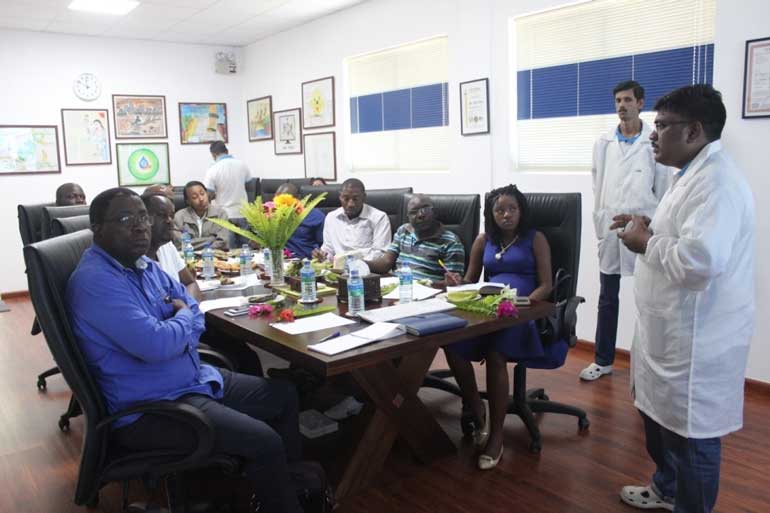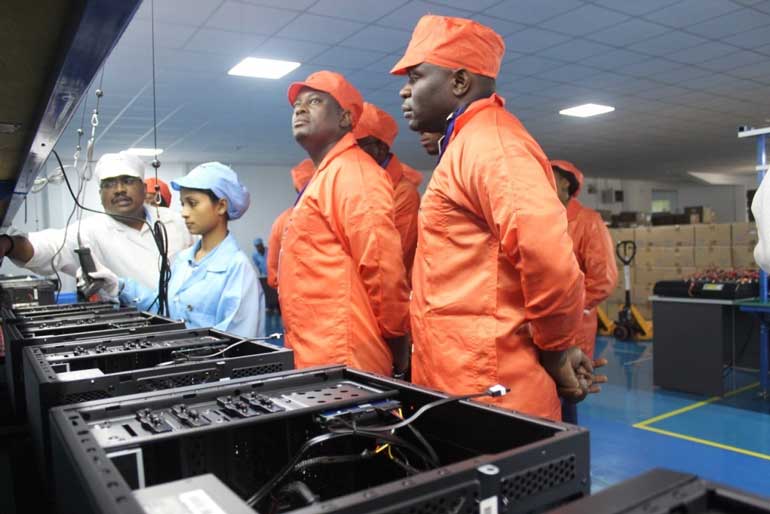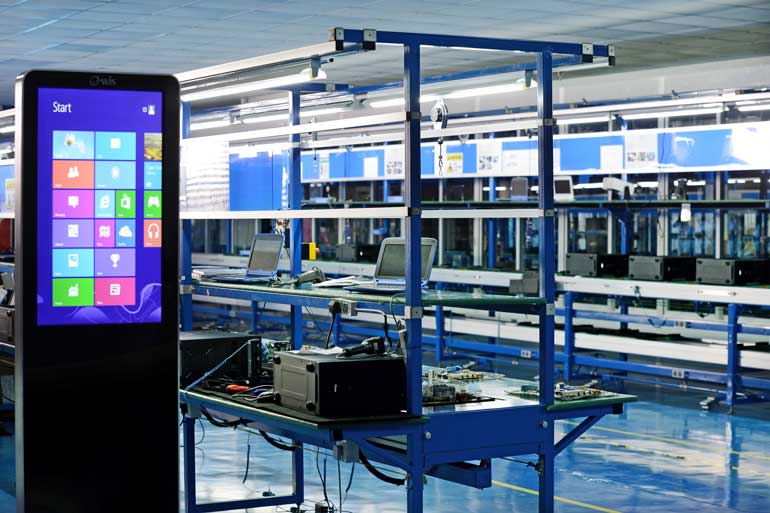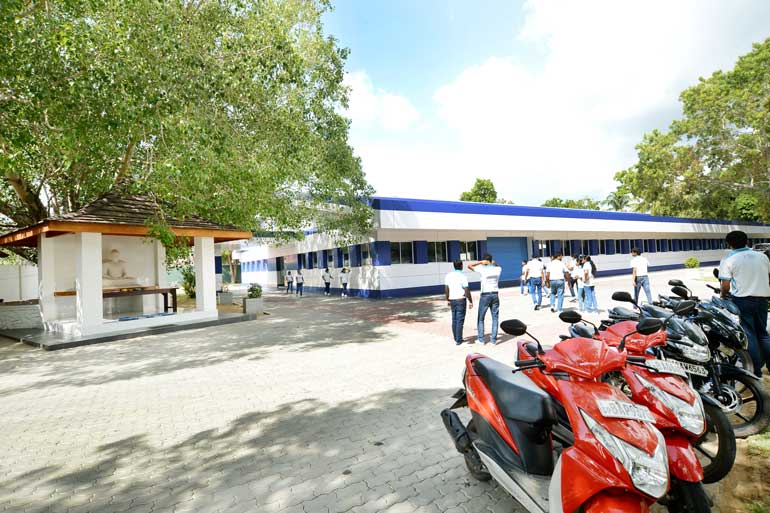Saturday Feb 21, 2026
Saturday Feb 21, 2026
Thursday, 17 December 2015 00:00 - - {{hitsCtrl.values.hits}}


A delegation of nine high-level officials arrived in Sri Lanka from ZICTA, the Zambian Information and Communications Technology Authority, in order to scope out the possibility of emulating the existing infrastructure in Sri Lankan ICT, namely the e-Wis factory. With one of the country’s most advanced computer, laptop, and tablet assembly plants, based in Sooriyaweva, the group was approached by Zambian officials eager to go into partnership.
The purpose of the visit was twofold, to initially gauge the level of advancement in the factory and whether it was possible to create a similar plant in Zambia, and secondly to embark on a joint partnership in order to facilitate the construction, training, and know-how. The key point of the venture that ZICTA is planning mainly focuses on supplying computers to the local education sector, not just in schools but also in universities, government institutions and government departments under their recently launched e-Government project.
The delegation visited the company’s headquarters in Colombo and the factory near Hambantota in order to gather information on operational aspects and necessary equipment and training. Deeply impressed by the standards of operation, they left Sri Lanka hoping to begin infrastructure as soon as possible.
Zambia’s ICT strategy
In conversation with ZICTA Acting Director of Human Capital Development and Administration Thomas Matandala, it was possible to learn more about the strategy for the governmental body in Zambia for ICT since 1994. He explained that, “The Government as a policy maker requires regulatory bodies like ZICTA to implement and drive a certain number of ICT projects like communication towers in rural areas and connecting schools and educational institutes. The aim is to create computer assembly plants initially for the education sector, then the Zambian Government and even the local followed by regional market.”
ZICTA’s hope is to open up the laptop and computer assembly factory in Zambia as soon as the first quarter of 2016 under the guidance of the e-Wis group. The group will provide mentoring throughout the whole value chain and provide advice as to the challenges and potential pitfalls. By then, the plant should be installed, commissioned, and start production although the logistics of machinery would take a long time. The immediate projection for factory jobs is about 130 both direct and indirect.
The Zambian Government’s approach is to create local, low cost products for youth and schools in order to free themselves from reliance on expensive important ICT products. The initial stage planned involved satisfying the educational sector. This has been galvanized by a memorandum of understanding between ZICTA and the Ministry of Education which will guarantee sale of the products at a subsidised rate. After the needs of the education sector, offloading to the general market can be considered.
SriLankan-Zambian partnership
When asked as to the reason why ZICTA and the Zambian Government chose Sri Lanka, Matandala went on to state, “It’s a small country but big things are happening here. While browsing on the internet, e-Wis came up. We had already pinpointed Sri Lanka well in advance, and ended up finding the factory amazing, and state of art. They want to create the same factory in Zambia. There’s a certain aspect of quality assurance embedded in the process.” He continued, “The Sri Lankan level of quality competes with any big market, which is why there is a lot of interest in Sri Lanka.”
Matandala also clarified that the Government and delegation did not find bureaucracy an issue. After issuing the tender, Sri Lanka was very easy to do business with, and the entire process took barely a week. He went on to praise the e-Wis leadership, being appreciative of the presence and attentiveness of the chairman himself, Sanjeewa Wickramanayake.
ZICTA representative Matandala claims that there are quite a few similarities between Sri Lanka and Zambia, especially because both the countries’ people are very open and friendly, even to outsiders. He did also say, however, that Zambians need to start picking up Sri Lanka’s penchant for small to medium industries. This is because most people in Zambia study and train hard to educate themselves in order to join a big company and have a sense of safety. Matandala explained that while this is commendable, this lack of entrepreneurial spirit simply does not create growth and new jobs. In reference to the Government’s involvement, he states that “The Government creates the environment of growth and opportunity, but cannot spoon feed its people jobs.”
He also commended what he saw as the Sri Lankan marriage between the Government and private sector, as embodied by the e-Wis group. “At the end of the day, it is the citizens that benefit from this marriage,” he said, continuing, “In 10-15 years, Sri Lanka will be a completely different place. Zambia too needs this partnership, without which there can be no growth.”
The importance of human capital
Matandala went on to mention that a substantial number of Zambians are well qualified in the sector and could be trained to run a factory. Once the factory is set up in Zambia, on the job training would be imparted after an initial session.
Much like Sri Lanka, Zambia has quite a young population. The USAID reports that of their populace numbering about 14 million, 74% consists of youth under the age of 30. Within that, around 28% are between the ages of 15 and 28. This means there is huge potential for growth in the economy and in various sectors. This is fuelled by a huge appetite for ICT and ICT equipment. Matandala went on to explain that the available supply in Zambia is not currently able to meet the growing demand, and there are also huge issues of accessibility and lack of affordability.
Zambia’s brain drain has not, however been as drastic as Sri Lanka’s. Many qualified and trained people have stayed within the country and are eager to work within the region. As ZICTA representative Matandala explained, “There is sufficient human capital to participate in the development of the country.”
Economic sustainability
The Zambian President, Edgar Lungu recently insisted in a recent address to Parliament that all schools must have technology by 2017. This is despite the country’s geographical limitations, such as almost inaccessible rural areas, lack of electricity, and lack of connectivity. Matandala explained that while these are big plans, they are necessary because ‘there is no point having a smart country of youth if there is no proper platform for them’. For this reason, they require the help and guidance of more established ICT sectors and companies such as that of Sri Lanka’s e-Wis. ZICTA and e-Wis have also been discussing taking sustainability further by tapping into e-Wis’ existing research and development for solar powered laptops. They are currently still in the testing stage, but the company hopes to take them into production at some point in the future. This is of key importance to Zambia, as the country’s rural areas barely see electricity from the grid, and plus the heavy load shedding and power outages have made even city electricity undependable.
The Zambian President has also started allocating and developing particular economic zones for industries. These have proven to be good opportunities for employment not just in terms of construction, but also for the long term opportunities they present. The Government plan is to create around 5000 jobs for youth between 2016 and 2017. This plan has so fair entailed building the zones’ infrastructure, which will then attract companies to start coming on board. The basic ICT zone infrastructure has already started construction, and would potentially include both regional companies and new businesses and entrepreneurs. So far, the only ICT businesses in the country are traders who buy and sell at a huge profit or repair electronic items.
Fostering growth
The appetite for growth seems obvious in Zambia, with the huge requirement for universities and technology in the country. In fact, the most prevalent industry is education. This is why the Government has shown such commitment to the youth and skill development. New ideas and local entrepreneurship can help wean Zambia off its reliance on copper exports to China. This is a potentially risky dependency which can only be relieved by heavy diversification within the country.
Given all these reasons, Zambia and consequently ZICTA are determined to make this partnership bear fruit, in order to propagate the vision of the President and kick start development in the country. Matandala firmly asserted that the delegation agreed that Sri Lanka and e-Wis were the right choice, especially given the need for a mentor in the process. ZICTA’s officials see the future as a bright path, and setting up the factory successfully as a blessing, as a job creation platform that can grow exponentially.

